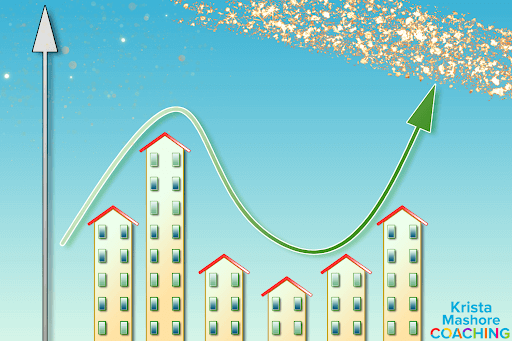Real estate is a fulfilling career that promises flexible schedules and high earnings. Yet, many real estate agents walk away despite the industry's allure. But why do many people quit being real estate agents?
This article will explain six reasons why real estate agents quit the industry. We will investigate factors such as high competition, unstable income, and long working hours. We will also explain how unrealistic expectations set agents up for dissatisfaction.
Finally, we will give you nifty tips to steel yourself against these challenges. We hope this article will provide valuable insights for those considering a career in this demanding yet rewarding field.
Let’s begin.
Why do many people quit being real estate agents?
We can attribute this phenomenon to many reasons. The most notable ones are
- High competition.
- Unstable income.
- Long working hours.
- Unrealistic expectations.
- Emotional toll.
- High costs of operation.
1. High competition

It feels like you can throw a dart in any direction, and it’ll hit a real estate agency. The pandemic made more people get into the real estate business. There are an estimated 3 million active real estate licenses in the United States alone. All these agents compete for similar clients.
Real estate agents under intense competition must stretch themselves thin to stand out. Unfortunately, high competition makes agents quit because of the following reasons.
- Difficulty finding clients.
- Lower commission rates.
- Reduced property listings.
- Difficulty differentiating themselves.
- Limited access to exclusive listings.
- Opting to cut corners.
Difficulty finding clients
High competition means many real estate agents race to secure the same clients. Established agents with robust networks and reputations overshadow newer agents because many clients opt to work with them. With time, less experienced real estate agents cannot keep up with the competition and quit.
Lower commission rates
High competition forces many real estate agents to lower their commission rates to keep up. Doing so reduces their earnings, making it challenging to cover their expenses and sustain their agencies.
Reduced property listings
In a competitive market, it is challenging for real estate agents to find enough listings to meet their clients’ demands. Why? Because properties get listed and sold quickly. Fewer listings mean reduced transactions and earnings. Many agents find themselves earning less and eventually quit.
Difficulty differentiating themselves
In a crowded industry, it’s challenging for many real estate agents to stand out from their competitors. Unsuccessful branding makes their agencies unrecognizable and forgettable. As a result, they get lost in the sea of renowned agencies and quit.
Limited access to exclusive listings
Well-established real estate agents often have privileged access to exclusive properties. This access gives them a competitive edge. Exclusive access persuades many clients to work with an agent. Less connected agents are disadvantaged and fail to keep up with their competitors, thus quitting.
Opting to cut corners
Some real estate agents can engage in unethical behavior to cope with high competition, such as lying about their experience. Unfortunately, cutting corners can damage their reputation and lead to legal problems, thus causing their agencies to fail.
2. Unstable income
Unfortunately, real estate is an industry influenced by many external factors that affect earnings. Inconsistent income strains agents, especially during low seasons, forcing them to rely on their savings. Let’s look at how agents struggle due to unstable incomes and eventually quit.
Irregular commissions
Real estate agents earn commissions based on the sale or purchase of properties. Their income depends on their ability to close deals. A slowdown in the real estate market means they earn less in that period. If the slowdown happens often or lasts long, then agents cannot make enough to sustain themselves and quit.
Market fluctuations

Real estate agents rely on a stable market to earn consistent income. Factors affecting house markets, such as unemployment, mean fewer buyers and sellers. Real estate agents in these markets have fewer opportunities to earn commissions.
Seasonal changes
Here’s something many people wouldn’t think affects real estate: seasons. More people want to buy and sell properties during warm seasons, such as spring and summer. Winter months have fewer people in the market for real estate.
Thanks to this fluctuating demand, many agents can’t maintain steady earnings and quit.
Unpredictable timelines
Buying or selling property is a long and tedious process for agents and clients. Steps involved in a real estate transaction include
- Property listing to sell or buy.
- Offer submission or receipt.
- Negotiation.
- Property inspections and repairs.
- Closing.
Realtors invest significant time and effort to ensure the process is successful. Unfortunately, clients can have a change of heart that makes the transaction unsuccessful. These unforeseen changes mean agents cannot close deals and thus cannot earn consistent incomes.
3. Long working hours
A perk of real estate is that agents can determine how long they want to work in a day. However, they have to dedicate long hours to have successful agencies. Many realtors work longer than 40 hours a week.
Long working hours create a work-life imbalance. Real estate agents often work evenings and weekends to accommodate clients' schedules. With time, some agents quit real estate for a less demanding career that allows them to spend time with their family and friends.
Aside from this imbalance, long hours affect realtors in the following ways.
Burnout
Mayo Clinic defines job burnout as physical and emotional exhaustion that involves reduced accomplishment and a sense of identity. Think of the last time you had to work very long hours. Your quality of work diminished, and if it went on long enough, you abandoned the task altogether.
Realtors are often under pressure to meet targets and handle client demands. To keep up with these demands, they have to work long hours. With time, they break down and quit.
Lack of predictable working schedules
Real estate deals are unpredictable, and agents don’t have control over their timing. They cannot determine the availability of a listing. They can’t also influence the availability of key people in a deal, such as repairmen, clients, and lawyers. As a result, agents work long hours to ensure they are available whenever these people need help.
High client expectations
Clients expect you to be available whenever they call. This reliability is a crucial part of ensuring their satisfaction with your services. They also expect you to facilitate transactions without any hiccups. You have to put in long hours to handle any crisis on behalf of a client.
Competition
Real estate is competitive, and agents try to put in more hours to match or surpass their competitors. It’s a norm to work long hours to maximize earnings, and agents who cannot put in more time become exhausted and abandon their careers.
4. Unrealistic expectations

A lot of people become real estate agents because it’s their passion. Others, however, pursue the career because of certain misconceptions. Unrealistic expectations lead to disappointment and a lack of dedication to real estate.
As a realtor, I’m sure you know of agents who got into real estate to “make a lot of money.” Thanks to real estate reality TV shows, others believe they would only show glamorous properties.
However, real estate involves more than that. The career involves lead generation, market research, paperwork, and complex transactions. If they’re unprepared for these roles, these agents grow frustrated and quit.
Additionally, real estate is an ever-evolving industry that needs frequent adaptation to new trends. If new realtors don’t receive training and support, they may struggle to meet their expectations and eventually quit.
5. Emotional toll

A job with long hours, unstable income, and high competition will affect anyone emotionally. Real estate agents face tight deadlines, demanding clients, and intense negotiations daily. The constant pressure to meet targets and close deals causes them stress and anxiety.
We mentioned how realtors have limited control over external factors, such as market fluctuations, regulatory changes, and economic conditions. Many agents feel helpless when faced with these factors and become frustrated and emotionally exhausted.
Buying or selling a home is a significant life event for most people. Real estate agents become involved in intimate moments of their clients’ lives. Clients come to their agents to express stress, uncertainty, or disappointment. Remember that they handle many clients' emotions at a time. They also become worn out with time, and many choose to leave the industry.
Finally, do you remember how we spoke about unstable income earlier? Financial uncertainty can create stress and anxiety, especially during slower market periods or when deals fall through unexpectedly. The constant need to secure new clients is also overwhelming.
6. High cost of operations
Real estate is an expensive industry to exist in as an agent. Some agents persevere and turn their agencies into lucrative operations. Some, unfortunately, fail to keep their head above the water. The operation expenses can outweigh the income generated, and realtors can find it challenging to sustain their businesses. As a result, they reconsider their career paths and quit.
Let’s detail some factors contributing to high operation costs for an agent.
Licensing fees
Every real estate agent must obtain a license to practice. Depending on your state, licensing fees range from $400-$1000 in the United States. These fees involve exams, background checks, and ongoing renewal. Additionally, realtors join professional associations and property listing services with membership fees.
Marketing expenses
Marketing is a vital part of real estate, and it’s expensive. Real estate agents typically invest in marketing to promote their services and listings. These costs include online advertising, photography, virtual tours, and printed materials, which can quickly add up.
Rent and equipment costs
An agency needs offices for the agent and other stakeholders. Maintaining a physical office space with utilities, furniture, and technology is a significant expense.
Insurance
Real estate agents often carry insurance to protect themselves against potential legal claims. Examples of insurance a realtor holds are
- General liability insurance.
- Errors and omissions insurance.
- Workers’ compensation insurance.
- Commercial auto insurance.
- Cyber liability insurance.
Insurance can be costly, especially for real estate agents who handle high-value properties.
Transaction expenses
Realtors bear some of the costs of real estate transactions, such as home inspections, appraisals, and legal fees. The longer the transaction, the more the costs add up. It’s easy for these expenses to exceed revenue, and some agents decide to quit.
Continuing education
Real estate agents should continually expand their knowledge and stay updated on industry trends. Additionally, it is a legal requirement for realtors to participate in continuing education (CE). Unfortunately, this education doesn’t come cheap.
Commission splits
Many real estate agents work under an agency and split their commissions with the agency. These splits can vary but often range from 50% to 70%. This split takes away a significant portion of their earnings.
Tips for improving your experience as a real estate agency
Despite the gloomy reasons agents quit, many thrive in the industry and carve out a name for themselves. A successful real estate agent takes steps to lessen the blows of these factors. Consider these tips to increase your chances of success as a real estate agent.
- Set aside funds equivalent to six months of operations to handle lean periods.
- Diversify your services in addition to traditional buying and selling. You can branch out and offer property management or real estate consulting services.
- Invest in building a referral network to increase the leads you generate.
- Find a niche and become an expert in it. You get quality leads as an expert and can leverage your knowledge to become a consultant.
- Partner with other agents to ease the burden of operational costs and lead generation.
- Find a mentor to guide you through challenging times and help you make informed decisions.
- Take care of yourself. Take breaks, exercise regularly, and seek activities that help you relax and recharge.
Conclusion
Real estate agents quit for many reasons, including high competition and unstable income. Long working hours and unrealistic expectations also weigh down on agents who pursue other careers.
Many real estate agents find support in the network they create. Set aside financial cushions and diversify your services to withstand the pressures of the industry. Focus on a niche and position yourself as an expert to help you diversify. Invest in your networks, find a mentor, and above all, take care of yourself.




